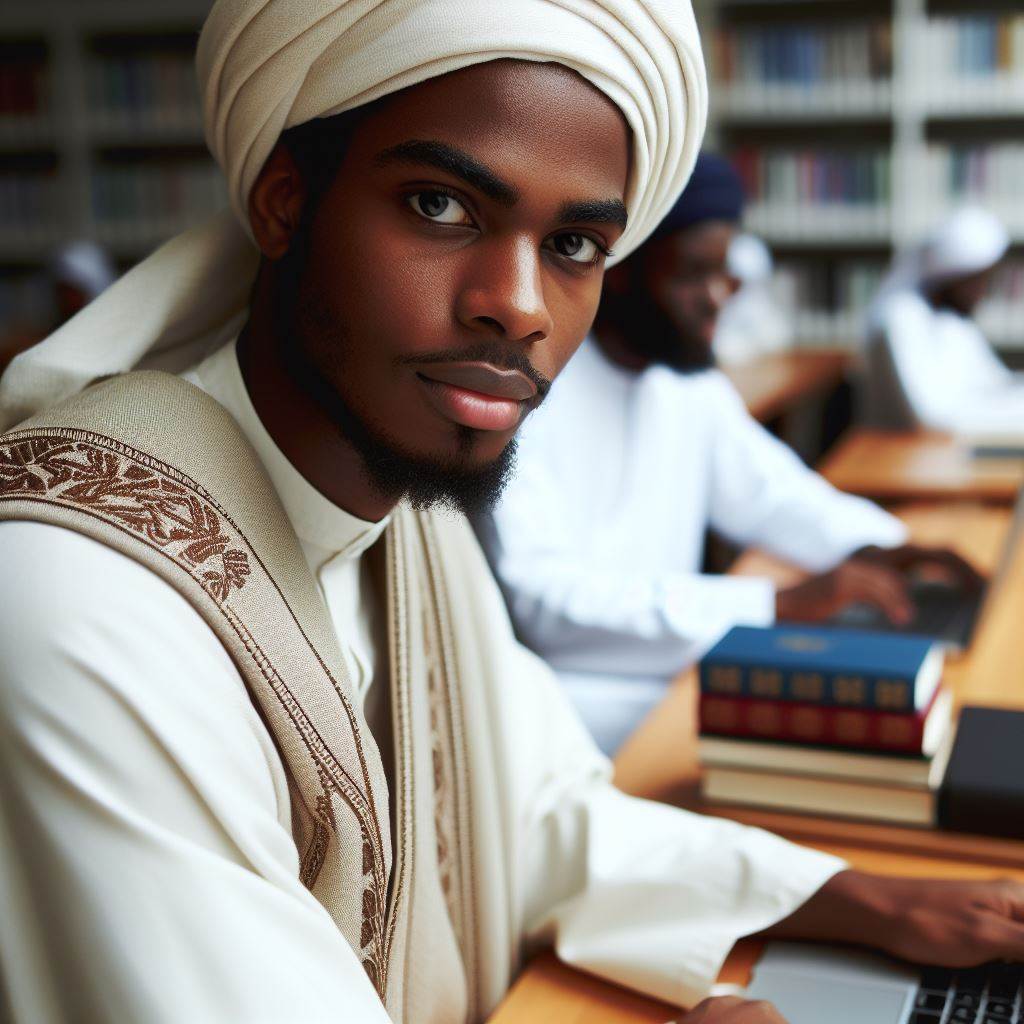Introduction
Focus of Study
Arabic Studies programs primarily focus on the Arabic language. They teach grammar, literature, and linguistics. Students learn to read, write, and speak Arabic fluently.
Islamic Studies programs, however, emphasize the study of Islam. They cover theology, law, history, and philosophy. These programs delve into the Quran, Hadith, and Islamic jurisprudence.
Curriculum Content
Arabic Studies
- Language skills: reading, writing, and speaking.
- Arabic literature: classical and modern texts.
- Linguistics: syntax, morphology, and phonology.
Islamic Studies
- Islamic theology: beliefs and practices.
- Islamic law: Sharia and Fiqh.
- History of Islam: key events and figures.
Career Opportunities
Graduates of Arabic Studies programs often work as translators or interpreters. They may also find jobs in international relations or journalism.
Islamic Studies graduates pursue careers as scholars, educators, or religious leaders. They may also work in non-profit organizations or academia.
Skill Development
Arabic Studies programs develop language proficiency. Students become adept in communication and literary analysis.
Islamic Studies programs foster critical thinking and deep understanding of religious texts. They prepare students for scholarly and community roles.
In essence, Arabic and Islamic Studies programs differ in focus, curriculum, and career paths. Both offer unique and valuable skill sets for diverse professional opportunities.
Curriculum and Course Structure
Comparing Arabic and Islamic Studies Programs
Curriculum and Course Structure
Arabic and Islamic Studies programs both offer rich academic experiences. However, their curricula and course structures differ in key ways. Understanding these differences can help students choose the right program for their interests and career goals.
Core Subjects in Arabic Studies Programs
Arabic Studies programs focus on language proficiency. Core subjects include Arabic grammar, syntax, and phonetics.
Students also study Arabic literature, exploring classical and modern works. History courses cover the evolution of the Arabic language and its cultural impact. Electives may include courses on Arabic dialects, translation, and advanced literature analysis.
Core Subjects in Islamic Studies Programs
Islamic Studies programs emphasize religious and historical aspects of Islam. Core subjects include Quranic studies, Hadith, and Islamic jurisprudence (Fiqh).
Students learn about Islamic history, covering periods from the Prophet Muhammad’s life to contemporary times. Electives often include courses on Sufism, Islamic philosophy, and modern Islamic movements.
Language Proficiency in Both Programs
Both programs emphasize language proficiency, but their focus differs.
Arabic Studies programs prioritize mastering the Arabic language. Students develop reading, writing, and speaking skills through intensive language courses. Islamic Studies programs also require Arabic proficiency, particularly for understanding religious texts.
However, they may also include courses in other languages relevant to Islamic scholarship, such as Persian or Turkish.
Literature in Arabic Studies Programs
Literature forms a significant part of Arabic Studies. Students read and analyze works from various periods, including pre-Islamic poetry and modern novels.
Literature courses often explore themes like love, war, and social justice. These courses help students appreciate the richness and diversity of Arabic literary traditions.
Literature in Islamic Studies Programs
In Islamic Studies, literature courses focus on religious texts. Students study the Quran, Hadith, and classical Islamic writings.
These courses help students understand Islamic teachings and their interpretations. Literature in this context is often linked to theology, law, and philosophy.
History in Both Programs
History courses are essential in both programs but with different emphases.
Arabic Studies programs cover the history of the Arabic language and its speakers. Topics include the rise of Arabic as a literary language and its role in various empires. Islamic Studies programs focus on the history of Islam.
Students learn about significant events, figures, and movements that shaped the Muslim world.
Religion in Both Programs
Religion plays a crucial role in both programs. Arabic Studies include courses on the religious texts that influenced the Arabic language.
These courses often discuss the Quran and Hadith as literary works. Islamic Studies programs delve deeply into religious teachings.
Core courses cover Islamic theology, law, and ethics, providing a comprehensive understanding of the faith.
Electives and Specializations
Both programs offer a variety of electives. Arabic Studies might include courses on media Arabic or comparative Semitic linguistics.
Islamic Studies might offer courses on Islamic art or contemporary Muslim societies.
These electives allow students to tailor their education to their interests. Comparing Arabic and Islamic Studies programs reveals distinct focuses and complementary strengths.
Arabic Studies emphasize language and literature, while Islamic Studies focus on religion and history. Both programs offer valuable insights into their respective fields, preparing students for diverse career paths.
Understanding these differences helps students make informed decisions about their academic pursuits.
Read: Career Paths in Communication and Language Arts
Faculty and Teaching Methods
Faculty Qualifications and Expertise
The Faculty members in Arabic and Islamic Studies programs are highly qualified. They hold advanced degrees and possess extensive research experience. Their expertise spans areas like Quranic studies, Islamic law, and Arabic linguistics.
Teaching Methods
Traditional Approaches
- Lecture-based learning: Professors deliver comprehensive lectures on core subjects.
- Textual analysis: Students analyze classical texts to understand traditional interpretations.
- Memorization: Students memorize key texts and verses, ensuring retention and comprehension.
Modern Approaches
- Interactive discussions: Professors encourage student participation and critical thinking.
- Technology integration: Online resources and digital tools enhance learning experiences.
- Project-based learning: Students work on projects to apply theoretical knowledge practically.
Unique and Innovative Practices
- Blended learning: Combines online and in-person instruction for flexible learning.
- Collaborative research: Encourages students to work with faculty on cutting-edge research projects.
- Cultural immersion programs: Offers students firsthand experience in Arabic-speaking countries.
Read: Scholarships for Communication Arts Students in Nigeria
Facilities and Resources
Evaluating the availability and quality of facilities and resources for Arabic and Islamic Studies students is crucial in determining the effectiveness of the programs.
Availability of Facilities
- Arabic Studies programs generally require language labs, multimedia resources, and cultural centers.
- Islamic Studies programs often need prayer rooms, Islamic libraries, and access to online databases.
- Both programs need classrooms equipped with audiovisual technology and study spaces for students.
Quality of Resources
- Libraries play a critical role in both Arabic and Islamic Studies, providing access to books, journals, and digital resources.
- Research centers are essential for students to engage in scholarly activities, attend lectures, and participate in academic conferences.
- Online resources, such as databases and e-journals, are equally important for conducting research and accessing up-to-date information.
Comparison of Libraries and Research Centers
- Arabic Studies programs may have specialized collections focusing on Arabic literature, linguistics, and history.
- Islamic Studies programs often boast extensive collections of Quranic manuscripts, Hadith literature, and Islamic jurisprudence texts.
- Research centers in both programs offer opportunities for students to collaborate with faculty members on research projects and publications.
Impact on Learning Experience
- Well-equipped facilities enhance the overall learning experience by providing students with access to resources that support their academic pursuits.
- Having access to state-of-the-art technology and comfortable study spaces can also boost students’ productivity and engagement with the material.
- Frequent use of libraries, research centers, and academic resources can help students deepen their knowledge and develop critical thinking skills.
Most importantly, the availability and quality of facilities and resources significantly impact the learning experience of Arabic and Islamic Studies students.
By providing access to well-equipped libraries, research centers, and academic resources, institutions can enhance the academic journey of students pursuing these programs.
Read: Comparing Communication Arts and Mass Communication

See Related Content: Famous Nigerian Fashion Icons and Their Styles
Find Out More: Art Collaborations in the Nigerian Creative Space
Student Support and Opportunities
When it comes to comparing Arabic and Islamic Studies programs, one important aspect to consider is the level of student support and opportunities provided within each program.
Student Support Services
Arabic and Islamic Studies programs typically offer a range of support services to help students succeed academically and personally. This may include academic advising, tutoring, counseling services, and mentorship programs.
These support services are designed to assist students in navigating the challenges of their coursework, managing their time effectively, and addressing any personal or academic issues that may arise during their studies.
Additionally, some programs may offer specialized support for students who are non-native speakers of Arabic or have specific learning needs, ensuring that all students have the resources they need to excel in their studies.
Opportunities for Experiential Learning
Arabic and Islamic Studies programs often provide opportunities for students to engage in experiential learning outside of the classroom. This may include internships, study abroad programs, and community engagement projects.
These experiential learning opportunities allow students to apply their knowledge in real-world settings, gain practical skills, and build connections within the field.
They also help students develop a deeper understanding of Arabic language and culture or Islamic history and principles.
By participating in internships or study abroad programs, students can enhance their language proficiency, cultural competency, and global awareness, all of which are valuable assets in today’s interconnected world.
Career Counseling and Placement Services
Arabic and Islamic Studies programs often provide career counseling and placement services to help students transition from their academic studies to the workforce. These services may include resume writing assistance, job search support, and networking opportunities.
Career counselors may work closely with students to identify their career goals, explore potential job opportunities, and develop a plan for achieving their professional aspirations.
They may also connect students with alumni or industry professionals for mentorship and advice.
Furthermore, some programs may offer job placement assistance to graduates, helping them secure employment in fields such as education, international relations, translation, or cultural preservation.
This ongoing support can be invaluable as students navigate their career paths post-graduation.
Generally, student support and opportunities play a crucial role in the success and satisfaction of students enrolled in Arabic and Islamic Studies programs.
By offering comprehensive support services, experiential learning opportunities, and career counseling, these programs empower students to achieve their academic and professional goals.
Read: Leading Communication Arts Departments in Nigeria
Learn More: Mass Communication Student Experiences in Nigeria
Cultural and Community Engagement
Arabic and Islamic Studies programs place a strong emphasis on cultural and community engagement activities to enhance students’ learning experience.
Exploration of cultural and community engagement activities offered by Arabic and Islamic Studies programs
The Arabic Studies programs often provide students with opportunities to engage with Arabic-speaking communities through language exchange programs and cultural events.
Transform Your Career with Expert Guidance
Get personalized mentorship consulting that’s tailored to your unique path. Our expert advice is actionable and exclusive.
Get StartedIslamic Studies programs, on the other hand, focus on fostering an understanding of Islamic culture, values, and traditions through guest lectures and discussions.
Comparison of extracurricular programs, events, and initiatives that promote cultural understanding and community involvement
Arabic Studies programs may organize Arabic film screenings, calligraphy workshops, and cultural festivals to immerse students in the richness of Arab culture.
Islamic Studies programs, on the other hand, often host interfaith dialogues, seminars on Islamic art and architecture, and community service projects to promote understanding and engagement.
Impact of these activities on the personal and professional development of students
Engaging in cultural and community activities helps students develop intercultural communication skills, empathy, and a deeper appreciation for diversity.
These experiences also enhance students’ ability to work collaboratively, think critically, and navigate complex social issues in their personal and professional lives.
Gain More Insights: Gender Studies within African and Asian Studies
Conclusion
In closing, there are notable differences and similarities between Arabic and Islamic Studies programs. Arabic Studies typically focus on language and literature, while Islamic Studies encompass broader religious and cultural aspects.
Studying Arabic provides a deeper understanding of the language, history, and culture of Arabic-speaking regions. On the other hand, Islamic Studies offer insights into the beliefs, practices, and contributions of the Muslim world.
Both programs play a crucial role in promoting cultural awareness and intercultural dialogue in Nigeria. By studying Arabic and Islamic Studies, students can enhance their cross-cultural communication skills and foster a more inclusive society.
It is important to recognize the significance of these programs in fostering diversity, tolerance, and mutual understanding in a multicultural society like Nigeria.
Promoting Arabic and Islamic Studies can contribute to building bridges between different communities and promoting peaceful coexistence.
Overall, the importance of Arabic and Islamic Studies programs lies in their ability to promote diversity, preserve cultural heritage, and foster intercultural understanding.
By embracing these programs, individuals can broaden their perspectives and contribute to a more harmonious society.




